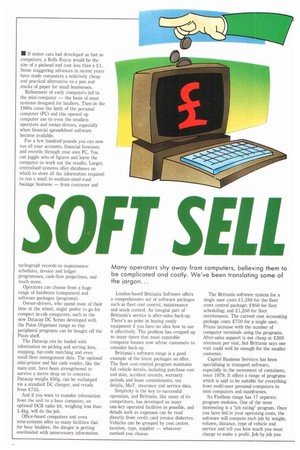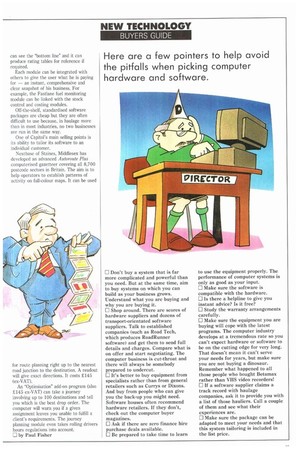S OF SE L L
Page 28

Page 29

If you've noticed an error in this article please click here to report it so we can fix it.
• If motor cars had developed as fast as computers, a Rolls Royce would be the size of a pinhead and cost less than a £1. Some staggering advances in recent years have made computers a relatively cheap and practical alternative to a pen and stacks of paper for small businesses.
Refinement of early computers led to the mini-computer — the basis of most systems designed for hauliers. Then in the 1980s came the birth of the personal computer (PC) and this opened up computer use to even the smallest operators and owner-drivers, especially when financial spreadsheet software became available.
For a few hundred pounds you can now run all your accounts, financial forecasts and records through your own PC. You can juggle sets of figures and leave the computer to work out the results. Larger, centralised systems offer databases on which to store all the information required to run a small to medium-sized road haulage business — from customer and tachograph records to maintenance schedules, invoice and ledger programmes, cash-flow projections, and much more.
Operators can choose from a huge range of hardware (computers) and software packages (programs).
Owner-drivers, who spend most of their time at the wheel, might prefer to go for compact in-cab computers, such as the new Datacap DC Series developed with the Psion Organiser range so that peripheral programs can be bought off the Psion shelf.
The Datacap can be loaded with information on picking and sorting lists, mapping, bar-code matching and even small fleet management data. The optional mini-printer and bar code reader, like the main unit, have been strengthened to survive a metre drop on to concrete. Datacap weighs 650g, can be recharged via a standard DC charger, and retails from £755.
And if you want to transfer information from the unit to a base computer, an optional DCR radio kit, weighing less than 1.4kg, will do the job.
Office-based computers and even mini-systems offer so many facilities that for busy hauliers, the danger is getting overloaded with unnecessary information. London-based Brittania Software offers a comprehensive set of software packages such as fleet cost control, maintenance and stock control. An integral part of Brittania's service is after-sales back-up. There's no point in buying costly equipment if you have no idea how to use it effectively. The problem has cropped up so many times that most reputable computer houses now advise customers to consider back-up.
Brittania's software range is a good example of the latest packages on offer. The fleet cost-control program maintains full vehicle details, including purchase cost and date, accident records, warranty periods and lease commitments, tax details, MoT, insurance and service data.
Simplicity is the key to successful operation, and Brittania, like many of its competitors, has developed as many one-key operated facilities as possible, and details such as expenses can be read directly from credit card invoice diskettes. Vehicles can be grouped by cost centre, location, type, supplier — whatever method you choose. The Brittania software system for a single user costs £1,250 for the fleet costs control package; £950 for fleet scheduling; and £1,250 for fleet maintenance, The current cost accounting package costs £750 for a single user. Prices increase with the number of computer terminals using the programs. After-sales support is not cheap at 2.300 minimum per visit, but Brittania says one visit could well be enough for the smaller customer, Capitol Business Services has been specialising in transport software, especially in the movement of containers, since 1979. It offers a range of programs which is said to be suitable for everything from multi-user personal computers to mini computers and mainframes.
Its Fastlane range has 17 separate program modules. One of the most interesting is a lob rating" program. Once you have fed in your operating costs, the software will compute each job by weight, volume, distance, type of vehicle and service and tell you how much you must charge to make a profit. Job by job you can see the "bottom line" and it can produce rating tables for reference if required.
Each module can be integrated with others to give the user what he is paying for — an instant, comprehensive and clear snapshot of his business. For example, the Fastlane fuel monitoring module can be linked with the stock control and costing modules.
Off-the-shelf, standardised software packages are cheap but they are often difficult to use because, in haulage more than in most industries, no two businesses are run in the same way.
One of Capitol's main selling points is its ability to tailor its software to an individual customer.
Nextbase of Staines, Middlesex has developed an advanced Autoroute Plus computerised gazetteer covering all 8,700 postcode sectors in Britain. The aim is to help operators to establish patterns of activity on full-colour maps_ It can be used
for route planning right up to the nearest road junction to the destination. A readout will give exact directions. It costs £145 (ex-VAT).
An "Optimisation" add-on program (also £145 ex-VAT) can take a journey involving up to 100 destinations and tell you which is the best drop order. The computer will warn you if a given assignment leaves you unable to fulfill a client's requirements. The journey planning module even takes rolling drivers hours regulations into account.
CI by Paul Fisher 0 Don't buy a system that is far more complicated and powerful than you need. But at the same time, aim to buy systems on which you can build as your business grows. Understand what you are buying and why you are buying it.
CI Shop around. There are scores of hardware suppliers and dozens of transport-orientated software suppliers. Talk to established companies (such as Road Tech, which produces RoadRunner software) and get them to send full details and charges. Compare what is on offer and start negotiating. The computer business is cut-throat and there will always be somebody prepared to undercut.
0 It's better to buy equipment from specialists rather than from general retailers such as Currys or Dixons. And buy from people who can give you the back-up you might need. Software houses often recommend hardware retailers. If they don't, check out the computer buyer magazines.
0 Ask if there are zero finance hire purchase deals available.
0 Be prepared to take time to learn to use the equipment properly. The performance of computer systems is only as good as your input.
0 Make sure the software is compatible with the hardware. CI Is there a helpline to give you instant advice? Is it free?
CI Study the warranty arrangements carefully.
CI Make sure the equipment you are buying will cope with the latest programs. The computer industry develops at a tremendous rate so you can't expect hardware or software to be on the cutting edge for very long. That doesn't mean it can't serve your needs for years, but make sure you are not buying a dinosaur. Remember what happened to all those people who bought Betamax rather than VHS video recorders! CI If a software supplier claims a track record with haulage companies, ask it to provide you with a list of those hauliers. Call a couple of them and see what their experiences are.
El Make sure the package can be adapted to meet your needs and that this system tailoring is included in the list price.




















































































